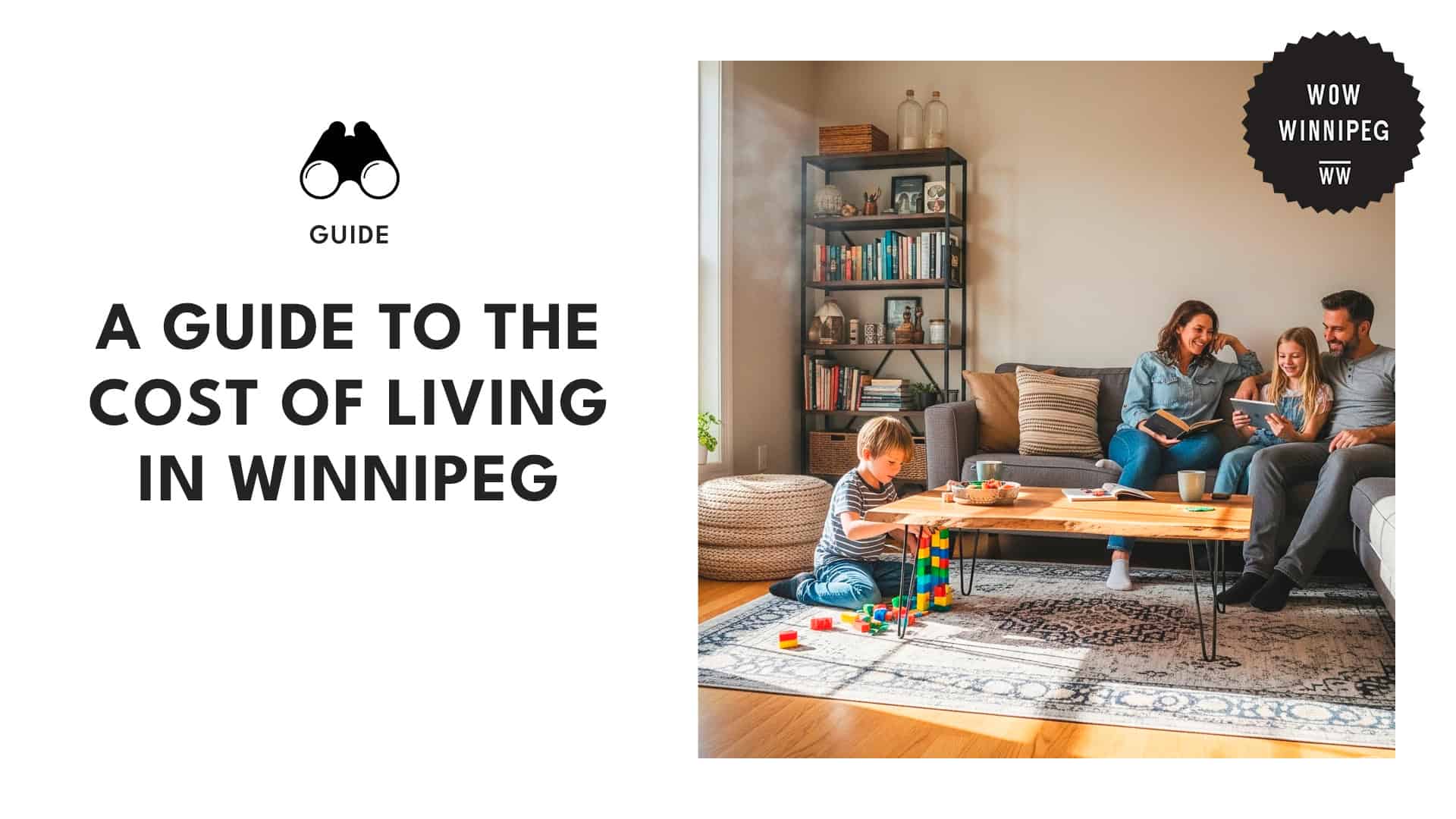An Honest Breakdown of Winnipeg Living Costs According to Locals
A lot of my friends from other countries always ask me what it’s like living in Winnipeg. I usually tell them it’s a mix of prairie vibes, a surprisingly strong arts scene, and some of the friendliest people you’ll ever meet.
But of course, the next question is always about money—what does it actually cost to live here?
That’s where this guide comes in, which is perfect if you’re thinking of moving here, planning a long stay, or just curious. I’ve broken down the real cost of living in Winnipeg, with insider tips and local hacks to help you get the full picture.
Cost of Living in Winnipeg
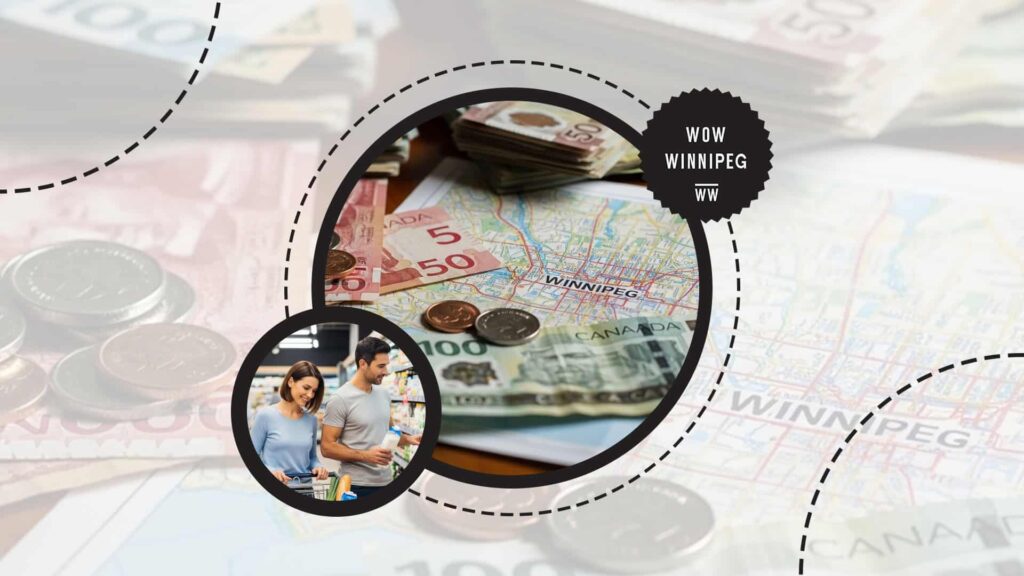
| The cost of living in Winnipeg is $5,162.8 per month for a family of four and around $1,439.1 per month for a single person. These include expenses like food, utilities, etc, but do not include rent or mortgage costs. Your total monthly budget may be higher depending on your housing type. |
Winnipeg is one of the most affordable major cities in Canada.
Daily expenses like groceries, transportation, and entertainment—all of which will be discussed later—are generally lower here compared to many other Canadian cities. This makes it a great option for families and singles looking to stretch their budget.
Here’s how Winnipeg compares to other big Canadian cities in the Cost of Living Index:
| RANK | CANADIAN CITY | COST OF LIVING INDEX |
| 1 | Surrey | 67 |
| 2 | Victoria | 65.9 |
| 3 | Vancouver | 64.3 |
| 4 | Hamilton | 64.3 |
| 5 | Toronto | 63.8 |
| 6 | Saskatoon | 62.8 |
| 7 | Calgary | 62.8 |
| 8 | Kelowna | 61.4 |
| 9 | Halifax | 61.2 |
| 10 | Mississauga | 60.5 |
| 11 | Ottawa | 59.7 |
| 12 | Montreal | 59.4 |
| 13 | Edmonton | 59.4 |
| 14 | Regina | 58.4 |
| 15 | Winnipeg | 58.3 |
| 16 | Quebec | 58.1 |
| 17 | London | 54.7 |
Winnipeg, with a Cost of Living Index of 58.3, ranks as the third most affordable major city in Canada, right after London and Quebec.
In contrast, Surrey sits at number 1 with an index of 67, meaning it’s noticeably more expensive than Winnipeg (a difference of 8.7 points).
Housing Costs
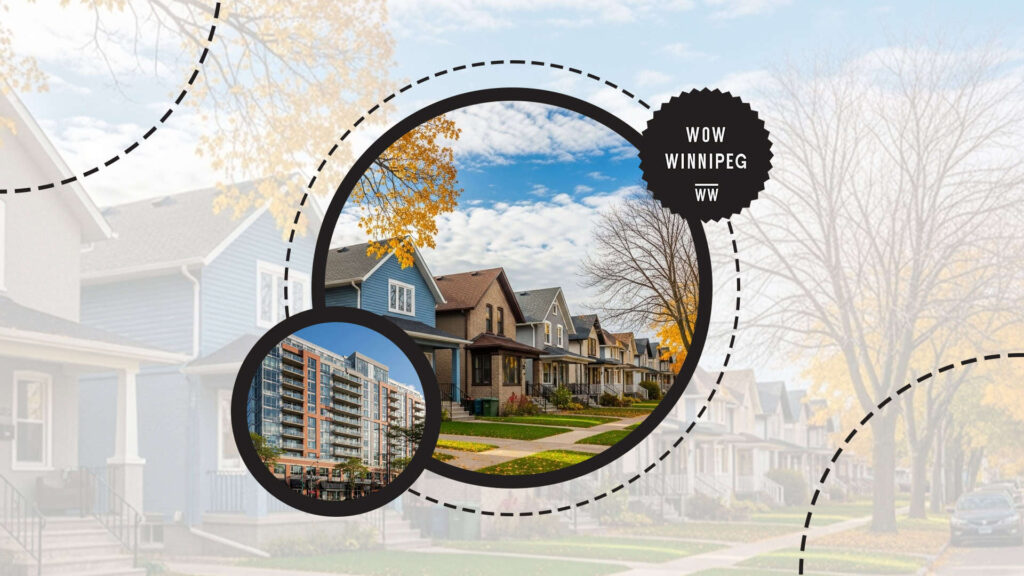
| In Winnipeg, rent costs an average of $1,348 per month, while overall real estate prices cost $389,800. |
Rental Costs
According to Apartment.com, Portage, La Prairie, and Winnipeg are the most affordable cities in terms of rent.
| CITY | AVERAGE RENT | AVERAGE SQ FT |
| Portage La Prairie | $914/month | 725 Sq Ft |
| Brandon | $946/month | 711 Sq Ft |
| Winnipeg | $1,348/month | 481 Sq Ft |
However, renters pay significantly more per square foot in Winnipeg compared to smaller Manitoba cities. This means that although it’s a great urban option, budgeting carefully for rent is especially important here.
To find affordable rentals in Winnipeg, look outside the downtown core. Neighborhoods a little further from the city center, like St. James, Transcona, or West Kildonan, often have lower rent prices while still offering good amenities and transit options.
You should also consider older apartment buildings or slightly smaller units. These can save you a lot per month compared to brand-new developments, and many still offer updated appliances and convenient locations.
Real Estate Costs
In terms of real estate, Winnipeg remains one of the most affordable major housing markets in Canada, according to WOWA.
Compared to other large cities, homes in Winnipeg cost significantly less while still offering solid long-term growth. Over the past decade, prices have risen steadily, outpacing inflation, but without the spikes seen in other markets.
Here are the benchmark home prices in major Canadian cities:
| CITY | BENCHMARK HOME PRICE |
| Winnipeg | $389,800 |
| Toronto | $981,000 |
| Montreal | $576,800 |
| Vancouver | $1,165,300 |
| Calgary | $582,900 |
This table highlights Winnipeg’s affordability compared to Canada’s largest cities. For buyers, this means Winnipeg offers a more accessible entry point into real estate while still providing long-term value growth.
If you’re looking to buy in Winnipeg, prices vary depending on the type of home you’re interested in. Here’s a quick look at the average costs for different property types in the city, as per CIC News:
| Property Type | Winnipeg |
| One-Story Single-Family Home | $422,900 |
| Two-Story Single-Family Home | $355,300 |
| Townhouse | $319,400 |
| Apartment | $226,000 |
Single-family homes tend to cost more, while apartments are the most affordable option. This breakdown helps you compare different types of housing and decide what fits your budget and lifestyle best in Winnipeg.
Utilities and Services
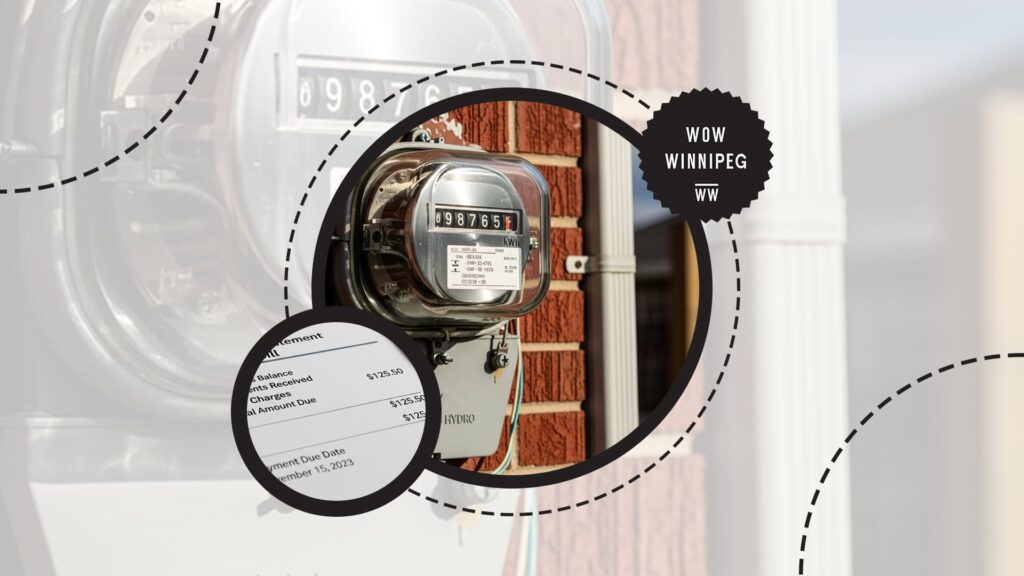
| In Winnipeg, the average monthly cost for basic utilities like electricity, heating, water, and garbage for an 85 m² apartment is around $203. If you include a mobile phone plan and internet, the total goes up to $345 per month, depending on the usage and provider. |
Living in Winnipeg comes with reasonable utility costs. From electricity and heating to internet and mobile plans, here’s what you can expect to pay on average each month:
| UTILITY | AVE MONTHLY COST |
| Basic (Electricity, Heating, Cooling, Water, Garbage) for 85 m² | $203.04 |
| Mobile Phone Plan (Calls + 10GB + Data) | $57.27 |
| Internet (60 Mbps + Unlimited Data) | $84.92 |
These costs are also fairly predictable, making it easier to plan your monthly budget.
For added savings, you should bundle your internet and mobile services with the same provider when possible. It will also help you simplify your bills.
Food and Groceries
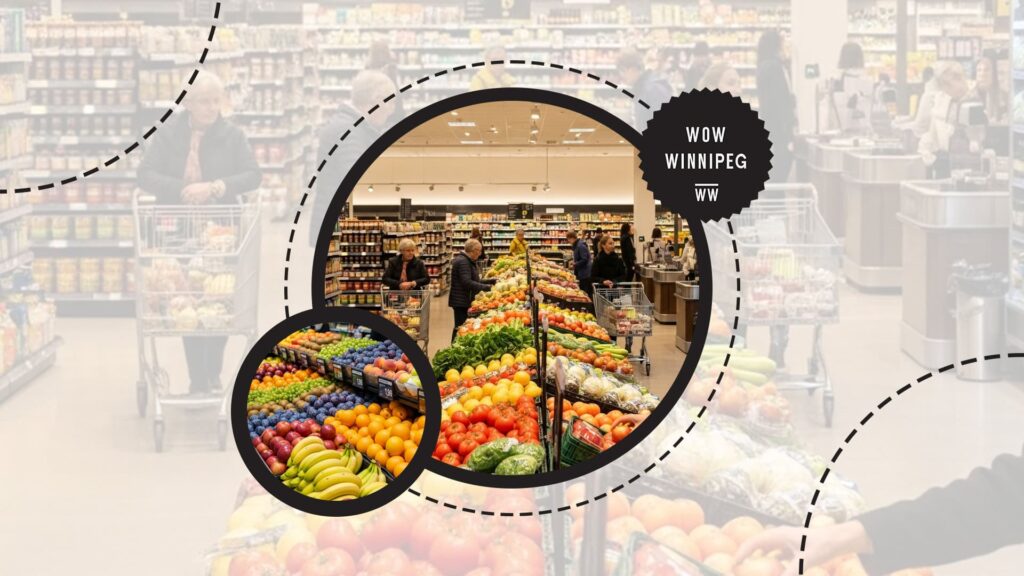
| A single person living in Winnipeg typically spends about $420 per month on groceries. Couples usually budget around $840 per month, and a family of four averages roughly $1,800 monthly. |
Groceries
Groceries in Winnipeg are generally affordable and accessible. Check out the table below so that you can get a good sense of monthly food expenses with these prices:
| GROCERY ITEM | AVERAGE PRICE |
| Milk (1L) | $2.26 |
| Loaf of White Bread (500g) | $3.18 |
| Rice (1kg) | $4.78 |
| Eggs (12) | $4.38 |
| Local Cheese (1kg) | $14.10 |
| Chicken Fillets (1kg) | $15.51 |
| Beef Round (1kg) | $23.49 |
| Apples (1kg) | $5.32 |
| Bananas (1kg) | $1.84 |
| Oranges (1kg) | $5.22 |
| Tomato (1kg) | $4.97 |
| Potato (1kg) | $3.63 |
| Onion (1kg) | $3.40 |
| Lettuce (1 head) | $3.46 |
| Water (1.5L) | $2.15 |
| Bottle of Wine (mid-range) | $17.49 |
| Domestic Beer (0.5L) | $4.39 |
| Imported Beer (0.33L) | $4.93 |
| Cigarettes (20 pack, Marlboro) | $22.00 |
In Winnipeg, grocery costs are reasonable for daily living, with fresh produce and basic staples widely available at moderate prices.
That said, Winnipeg ranks 13th most expensive for domestic beer (0.5L bottle) out of 68 cities in North America. It also ranks 17th most expensive for milk and 25th most expensive for lettuce.
Keep in mind that buying in bulk for items like rice, potatoes, and chicken or shopping at discount grocery stores can save you a noticeable amount each month.
Dining Costs
Eating out in Winnipeg won’t empty your wallet. Prices are lower than in bigger Canadian cities, so you can enjoy more variety without overspending.
| TYPE OF DINING | AVERAGE COST |
| Fast Food | $12 – $14 |
| Casual Meal (1 Person) | $20 – $25 |
| Mid-Range Restaurant (2 People, 3-Course) | $90 – $100 |
| Coffee (Regular Cappuccino) | $5 – $6 |
| Beer (0.5L Draft) | $6 – $8 |
A McDonald’s combo or similar meal averages around $13. For about $20 to $25, you’ll get a sit-down meal at a pub, cafe, or diner. And for date night or a special dinner, a three-course meal for two at a mid-range restaurant runs close to $100.
Many Winnipeg restaurants offer great daily specials or happy hour deals. If you’re on a budget, check out local diners and ethnic spots for generous portions at lower prices.
Transportation Costs
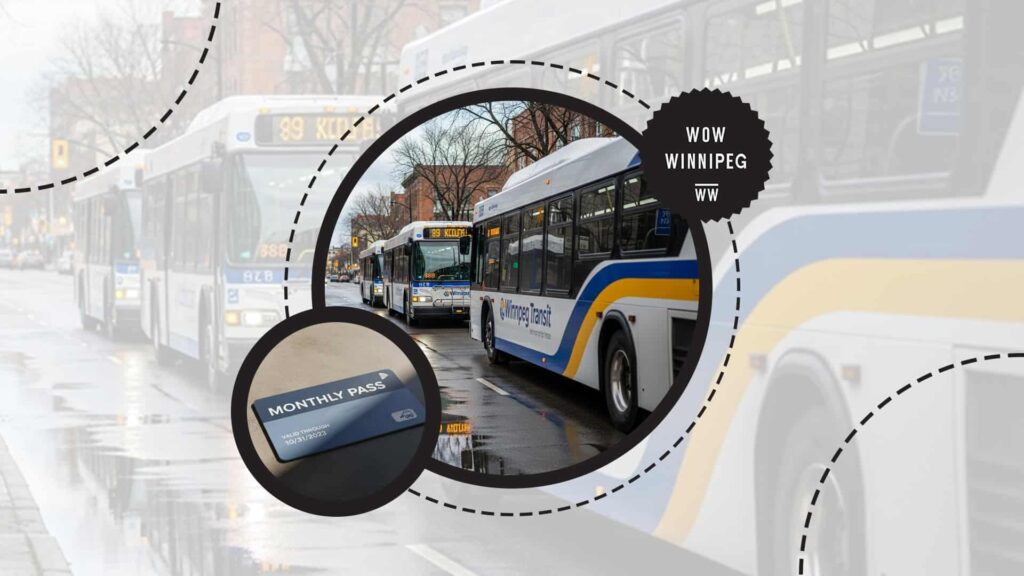
| The average transportation cost in Winnipeg is $100. Riding the bus costs $3.15 per ride or $103.5 for a monthly pass, while driving fuel averages around $80 to $100 per month. Seniors and youth enjoy discounted bus fares. |
Getting around Winnipeg is affordable and convenient, whether you use public transport, drive, or cycle. For a clearer picture, here are the average costs of different transport types you can use in the city:
| TRANSPORT TYPE | AVERAGE COST |
| One-Way Bus Ticket | $3.25 |
| Monthly Bus Pass (Regular) | $115 |
| Taxi Start (Normal Tariff) | $4.25 |
| Taxi 1 km | $1.95 |
| Taxi 1-Hour Waiting | $34.20 |
| Gasoline (1 Liter) | $1.42 |
Riding the bus in Winnipeg is an affordable and convenient choice, especially with discounted passes for seniors and youth, or a Preggo card for extra savings.
Driving is reasonably priced, though costs vary depending on how often you hit the road. Taxis are the best for occasional trips since fares can add up quickly with distance and waiting times.
Don’t forget the city’s bike-friendly infrastructure—cycling is a nearly free, healthy alternative compared to other transport types.
Healthcare and Insurance

| In Winnipeg, public health coverage via Manitoba Health is free for essentials like doctor visits and hospital stays. Most also get supplemental or private insurance for dental, vision, and mental health. These range from $50 to $200 per month, depending on age, coverage, and provider. |
Manitoba residents are lucky to have Manitoba Health, the province’s insurance plan, which takes care of essential medical services like doctor visits at no cost.
But since it doesn’t cover everything, programs like Pharmacare and private insurance help fill in the gaps.
Here’s a quick breakdown of how healthcare coverage and costs work in Winnipeg:
| CATEGORY | COVERAGE & COSTS |
| Manitoba Health | Covers essential services like doctor visits and hospital stays—no direct costs to residents |
| Manitoba Pharmacare | Income-based drug program. Annual deductible starts at $100 per year (varies by family income). After that, eligible prescriptions are covered. |
| Private Insurance | Fills the gap for dental, vision, and extra prescriptions. Average premiums: $60 per month (single), $110 per month (couple), $175 to $180 per month (family). |
In a nutshell, Manitoba Health keeps core healthcare free, so if you’re new to the province, apply as soon as possible so you’re covered from day one. Make sure to keep your health card handy at all times—you’ll need it for every appointment.
Pharmacare makes prescription drugs more affordable, but keep in mind that it’s income-based. To help you plan your budget, you can check the online Pharmacare Deductible Estimator to see what your deductible might be.
Private insurance offers peace of mind for services not included in the public plan. But remember, not all insurance covers the same extras—look for one that matches your needs, whether that’s dental, massage therapy, or prescriptions.
Entertainment and Leisure

| Leisure and entertainment in Winnipeg cost about $100 to $150 per month. A movie ticket is around $17, a gym membership averages $55 per month, and renting a tennis court is about $47 per hour. |
The good news is, Winnipeg has something for everyone. You could catch a ballet performance one night, cheer for the Jets the next, then spend Sunday skating or biking at Assiniboine Park.
Here are some entertainment costs in Winnipeg:
| ACTIVITY | AVERAGE COST |
| Fitness Club, Monthly Fee, 1 Adult | $55.71 |
| Tennis Court Rental (1 hour) | $46.86 |
| Movie Ticket (International Release) | $17 |
| Monthly Entertainment Budget | $100 to $150 |
| Winnipeg Folk Festival (General Concert) | Around $49 per ticket |
| Royal Winnipeg Ballet (Standard Seat) | Around $48 to $217 |
| Winnipeg Jets Game (Ticket + Food + Parking) | Around $102 |
Here, you’ll love the mix of world-class institutions like the Royal Winnipeg Ballet and the Canadian Museum for Human Rights, alongside quirky local galleries.
For music lovers, Winnipeg is famous for festivals, like the Winnipeg Folk Festival and Winnipeg Fringe Theatre Festival. Similarly, sports fans can cheer for the Winnipeg Jets or the Blue Bombers.
Fitness buffs can enjoy gyms and yoga studios. And if you’re an outdoorsy type, there’s no shortage of free fun, like biking trails or skating the Red River Mutual Trail in winter.

